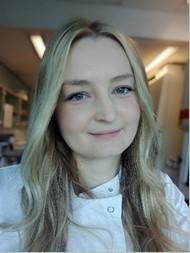Biography
Dr Wioleta Zelek is a UK DRI Emerging Leader with a prestigious Race Against Dementia (RAD) Fellowship – sponsored by Group Leader Prof Paul Morgan (UK DRI at Cardiff). Dr Zelek trained in Chemistry and after several years in the Biotech sector, returned to academia and undertook a PhD in Immunology, focused on the complement system. During her PhD, and Fellowships (ISSF Wellcome Trust, Health and Care Research Wales) she developed a toolbox of novel complement inhibitors, including patent protected drug candidates (PCT/EP2020/073430) and other tool reagents enabling the study of complement in animal disease models. Dr Zelek’s main goal over the course of the Fellowship project is to develop brain penetrant anti-complement drug candidates to target neuroinflammation, a critical driver of pathology in Alzheimer's disease.
News
Key publications
Zelek Lab
Explore the work of the Zelek Lab, focusing on developing a new approach to Alzheimer's disease therapy; brain penetrant anti-complement drug(s), providing better ways of treating Alzheimer's disease and other dementias



